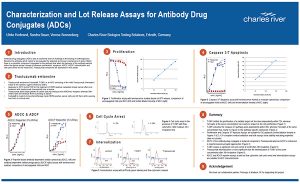 Antibody-drug conjugates (ADCs) add an additional level of challenge to testing of biotherapeutics. Besides the antibody, which needs to be evaluated for potential and known mechanisms of action (MoA), there is a cytostatic compound conjugated that alters the behavior of the antibody-vehicle within the typical assays. Therefore, characterization of new innovators as well as biosimilarity assessment is even more challenging than it is for antibody therapeutics.
Antibody-drug conjugates (ADCs) add an additional level of challenge to testing of biotherapeutics. Besides the antibody, which needs to be evaluated for potential and known mechanisms of action (MoA), there is a cytostatic compound conjugated that alters the behavior of the antibody-vehicle within the typical assays. Therefore, characterization of new innovators as well as biosimilarity assessment is even more challenging than it is for antibody therapeutics.
Using the example of Trastuzumab emtansine, Charles River has set up a panel of suitable assays for the characterization and quality control (QC) testing of ADCs to ensure that clients have the assays they need to address these types of products.
Due to the nature of antibody drug conjugates, typical MoA-reflecting bioassays will be suitable for QC purposes and cover the inhibition of cell proliferation and the cytotoxicity mechanisms (e.g., via apoptosis pathways). We offer a classical proliferation assay with luminescence readout and a Caspase 3/7 apoptosis assay with luminescence readout for these purposes. Both assays are suitable for ICH Q2(R1)-compliant method validation and show stability-indicating properties.
For characterization purposes, classical immunological pathways mediated via the crystallizable fragment (Fc) part of the therapeutic antibody need to be addressed, since the Fc region of therapeutic antibodies can have an important role in their safety and efficacy. We offer testing of antibody-dependent cellular cytotoxicity (ADCC) and antibody-dependent cellular phagocytosis (ADCP) using surrogate reporter approaches reflecting the MoAs via FcgRIIIa and FcgRIIa. On the other hand, the internalization of ADC and MoA of the cytostatic compound need to be addressed. For this purpose, we offer flow cytometric readout with both an internalization assay and a cell cycle arrest assay.
As the number of ADCs in development grows, companies continue to refine their approaches to look at the efficacy and safety of these products. It is important that companies consider ADCs as unique molecules that require some specialized testing approaches.
This poster addresses assays to measure proliferation, apoptosis, ADCC, ADCP, internalization, and cell cycle arrest for the model ADC Trastuzumab emtansine and demonstrates results from comparison of the model ADC to an unconjugated monoclonal antibody.
If you would like to learn more about our offerings in this area, contact us at askcharlesriver@crl.com
